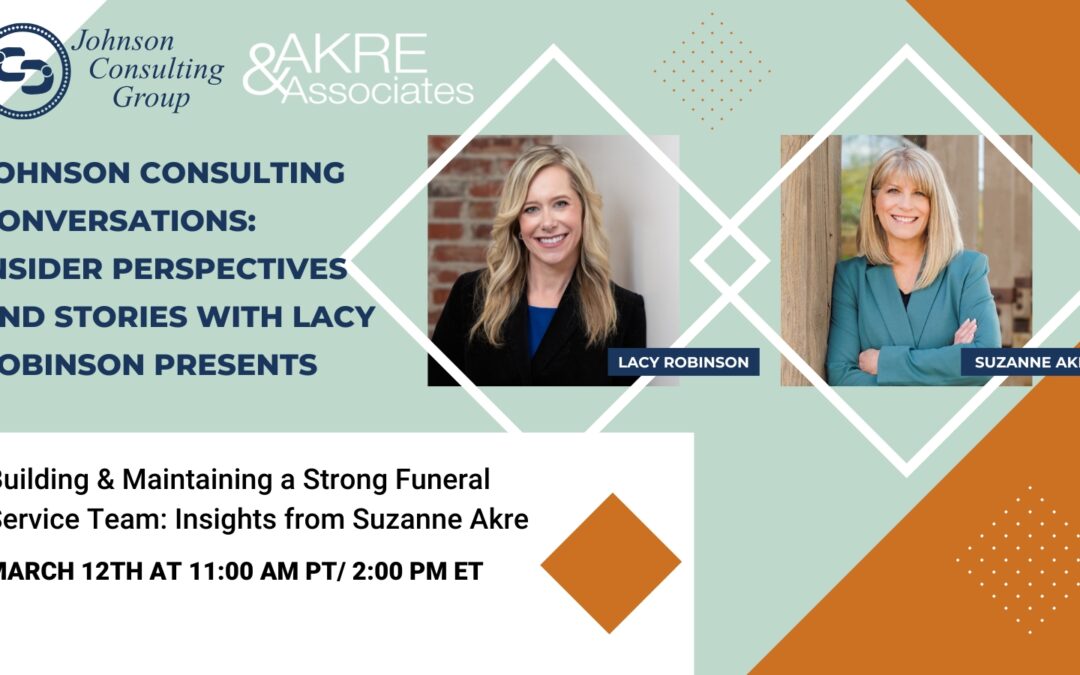In our latest Johnson Consulting Conversations, we spoke with Suzanne Akre, Founder and CEO of Akre & Associates and Akre Legacy Recruiting. With over 30 years of recruiting experience, Suzanne shared valuable insights about recruiting in the funeral service profession.
Suzanne never set out to recruit for funeral service—it found her. About a decade ago, her firm began recruiting leaders for an organization serving the death care industry. As her network grew, she discovered that funeral homes, cemeteries, suppliers, and death-tech companies share a common challenge—finding qualified talent.
One challenge that Suzanne often encounters is funeral provider clients being able to give enough time to the hiring process. She understands how busy a funeral owner or manager can be and is committed to keeping all parties involved updated.
In discussing missed opportunities for prospective candidates Suzanne mentioned that funeral directors rarely manage their brand, making traditional recruiting tools ineffective. Most don’t have a professional social media presence and are so dedicated to serving families that they don’t focus on their career growth. Even professionals desperate for change hesitate to take the first step. With that in mind Suzanne established www.akrelegacyrecruiting.com, creating a landing spot for both funeral providers and professionals seeking career changes.
Suzanne’s recruitment process begins with learning about the company’s culture, staff, role history, families served, compensation, growth opportunities, and onboarding. After securing an agreement, her team sources talent, facilitates interviews, and manages the entire process through to placement and beyond.
Timeframes for filling positions vary significantly but on average it takes three to six months to complete the process. Factors affecting this timeline include geographic challenges, candidate response times, interview scheduling priorities, compensation packages, counteroffers, and relocation issues.
We discussed common mistakes that can be avoided. “Time kills deals!” Suzanne emphasized when identifying hiring mistakes. Taking too long to engage candidates, allowing toxic employees to participate in interviews, providing incomplete offer letters, assuming automatic trust, and conducting impersonal interviews are common pitfalls that cost funeral homes top talent.
It was interesting to hear Suzanne’s perspective on what today’s funeral service professionals seek in workplaces that value them personally and professionally. They want guilt-free PTO, mental well-being support, clear advancement paths, mentorship, and supportive leadership. When choosing employers, they prioritize compensation, location, culture, colleague attitudes, and relocation assistance.
Successful funeral homes build strong teams by offering competitive compensation, implementing thorough onboarding, treating employees exceptionally well, acknowledging community involvement, providing encouragement, and having owners who actively support their staff.
The next generation of funeral directors brings different expectations. Most weren’t born into this business and many experienced a personal death young, giving them a deep drive to help others. They expect fair pay, mentorship, career growth, mental health support, clear communication, and technology integration.
As an instructor at Worsham College of Mortuary Science, I’ve observed these shifting mindsets firsthand. Today’s students are passionate about serving families while seeking balance. They’re tech-savvy and ask more questions during interviews about schedules, mentorship, and growth opportunities.
We talked in depth about second-career professionals who do differ notably from new first-career graduates. As Suzanne perfectly stated, second-career professionals have “already done difficult things” and know their capacity for hard work. Many are drawn to funeral service by personal experiences and bring higher emotional intelligence with less fear of the field. It’s not uncommon for them to have held management positions. It’s important to know they expect independence and seek leadership opportunities sooner.
Suzanne shared valuable advice for funeral service professionals wanting to stay competitive. First, keep developing technology skills, work on public speaking abilities, update professional online profiles, leverage networking capabilities, and consider attending compassion cultivation training.
For mortuary students, Suzanne recommends building a professional brand, maintaining a professional social media presence, finding mentors, joining community organizations, developing healthy habits, and remembering their crucial role in guiding families through difficult times. In my Worsham College role, I emphasize that technical skills alone won’t guarantee success. The graduates who thrive combine interpersonal abilities, adaptability, and commitment to learning with their technical knowledge.
The insights from our conversation highlight the evolving landscape of funeral service recruiting. By focusing on culture, professional development, and adapting to today’s workforce expectations, funeral providers can succeed in an increasingly competitive market. For more information about Suzanne’s specialized recruiting services, visit www.akrelegacyrecruiting.com.
Join us for our next conversation with Amanda Hill of Female Forward on April 9th, discussing how funeral providers can better market to female consumers.
Contact JCG Today!